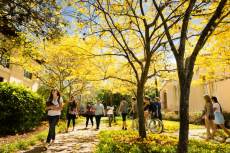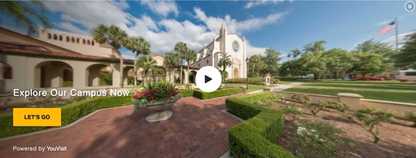Around the World in 8 Days
With passion and purpose, Tars set out this past spring break to explore real-world issues and grow as global citizens.
By Gigi Marino
April 28, 2023

Whether it was exploring the remains of Viking settlements, learning about turtle conservation in the Caribbean, or examining issues of race in our nation’s capital, Rollins students like English and history double major Reagan Cooney ’25 used their spring break to further their interests, expand their worldview, and enhance their experiences in the classroom.
“Spending time at the Kronborg Castle—the setting of Shakespeare’s Hamlet—hit every interest of mine,” says Cooney, who recalls feeling the Renaissance come alive as she moved among the medieval architecture and statues, the turrets and battlements, and the crypts and catacombs. “I got so much more out of the experience because of my coursework at Rollins, which has helped me understand, appreciate, and place the castle’s design, furnishings, and artifacts in a historical context.”
These Alternative Spring Break (ASB) opportunities for students to experience a different culture up close, see a real-world issue play out in the lives of a community, or watch history come to life are key drivers of global citizenship and responsible leadership. From faculty-led field studies to service Immersions, discover the biggest takeaways from this year’s six ASB experiences.

Vikings and the Politics of Race
Faculty Leaders
- Jana Mathews, professor of English
- Emily Russell, professor of English and Kenneth Curry Chair of Literature
Location
Denmark and Sweden
The Scoop
Vikings ruled the northern seas for centuries—8th through 11th, to be exact—trading with and raiding their European neighbors. Today, Viking symbols, iconography, and modern mythology are alive and well in the 21st century.
“Think NFL team logos and Marvel superhero movie casting,” says English professor Jana Mathews. “But what is the relationship between myth and reality? Who exactly were the Vikings? How was Viking ethnicity formed and identity constructed over the centuries? Most importantly, perhaps, what does our fantasy view of Vikings say about us?”

Vikings and the Politics of Race, a general education capstone course, seeks to answer these questions as well as examine how the idea of the “Viking” informs contemporary identity politics. During the field study portion of the class, students traveled to Denmark and Sweden, exploring the remains of medieval Viking settlements and fortresses, longboats and ceremonial mounds, and the most impressive display of Viking artifacts in the world. They began in Helsingor, Denmark, at the Kronborg Castle and finished at the National Museum in Stockholm, Sweden, visiting other castles, museums, cathedrals, and pubs along the way. They even joined in a wilderness cooking lesson with locals that involved cooking venison over an open fire.
“Learning from our hosts about how they understand their lifestyle and mindful orientation to the land as an extension of centuries-old Danish traditions was inspiring,” says English professor Emily Russell.
Biggest Takeaway
“Field studies are such a great way to explore the world and try new things,” says Cooney. “I was excited to participate in this field study and take this class in order to analyze the intersection of politics and culture in Viking history, but I learned so much more—like how the locals interacted with nature and their environment.”

Learning and Teaching About the Holocaust
Faculty Leaders
- Yudit Greenberg, Director of Jewish Studies Program and George D. and Harriet W. Cornell Professor of Religious Studies
- H. James McLaughlin, Richard James Mertz Chair of Education and professor of education
Location
Krakow, Poland
The Scoop
The goal of this field study and linked course is to delve into the lives of those affected by the Holocaust and examine how the Holocaust is represented in memoirs, poetry, film, and fiction. Students immersed themselves in narratives of survivors, stories of resistors, and diaries of the dead, learning about Polish and German life prior to Hitler’s reign and about ways to teach this complicated subject at the elementary- and secondary-school levels. A focus of the field study is a study tour of Auschwitz-Birkenau, the largest Nazi concentration camp, where more than 1 million people perished.

“But this is not a course just about victims,” says education professor H. James McLaughlin. “Yes, we look at death and evil, but we also look at generosity and heroism. Resistance and survival. I want the students to leave with the understanding that the world is a very complex place and the evil of the Holocaust isn’t the only story to tell.”
Biggest Takeaway
“Visiting the locations where these tragic events unfolded is an emotional and impactful experience,” says international relations major and World War II history buff Ben Mack-Jackson ’24. “This field study allowed us to connect with history on a personal level. Everyone who participated undoubtedly has a newfound or renewed appreciation for the importance of learning about the Holocaust so that such events never happen again.”

Southern Lit Road Trip
Faculty Leaders
- Matt Forsythe, associate professor of English
- Paul Reich, associate professor of English
Location
Southern United States
The Scoop
The literature of the American South chronicles the national condition. It speaks to our hopes and our sins, our sense of who we were, who we are, and who we might become. Led by English professors Matt Forsythe and Paul Reich, students hit the road, traveling through Georgia, Alabama, Mississippi, and Louisiana, where they listened to the rustling of Jean Toomer’s cane fields, stood in the room where Jim Williams shot his lover, and walked into landscapes and spaces that inspired William Faulkner, Flannery O’Connor, and Eudora Welty.

They also examined the legacy of enslaved people at the Legacy Museum and the National Memorial for Peace and Justice, recognizing the continued burden that persons of color carry in a land marked by their terror, their perseverance, their trauma, and their joy.
Biggest Takeaway
“Seeing the places where writers like Faulkner and Welty constructed their works was inspirational and awe-inspiring,“ says English major Grace Williams ’24, “because at one point, they were students too—just like us. They were dreamers too. We were also able to engage in open, honest, and sometimes difficult conversations that result from being in these historical places.”

Service Learning in Trinidad and Tobago
Program Leader
- Mary Choi Robinson, assistant director of international programs
The Scoop
Tars traveled to the Caribbean island nation of Trinidad and Tobago as part of a service Immersion focused on conservation, community development, and cultural heritage. In the capital city of Port of Spain and the small town of Madura, students partnered on service projects with two women-led nonprofits that are making a difference in their communities through fighting forest fires, providing education on fire safety, and protecting leatherback sea turtles. Other highlights included exploring the Caribbean Indo Museum and the Caroni Bird Sanctuary, which is home to more than 20 endangered species.

“We actually had the rare privilege of watching a female leatherback turtle create her nest, lay her eggs, make a false nest to protect the real one, and then swim back to the ocean,“ says Mary Robinson, assistant director of international programs. “I think experiencing moments like that really helped the students understand that they each have a gift or talent they can use to make small changes for larger impacts.“
Biggest Takeaway
“This Immersion has been an incredible asset to my college experience,” says education and theatre double major Riley Steege ’23. “I was able to fully immerse myself in another culture, broaden my worldview, and educate myself about social issues in another country and how I can continue this work beyond this service experience.”

A Racial Legacy in Action
Program Leaders
- Ashley Samson, graduate assistant at the Student Center for Inclusion & Belonging
- Nicole Solomon ’21, graduate assistant at the Student Center for Inclusion & Belonging
- Marjorie Trueblood, dean of the Student Center for Inclusion & Belonging
- Samantha Vega, director of the Student Center for Inclusion & Belonging
Location
Washington, D.C.
The Scoop
Our nation’s capital proved fertile ground for the goal of this ASB: for students to refine their personal definitions of “racial legacy” and to connect with historical and contemporary figures who were pushing for the affirmation of the dignity of people of color. From visiting Howard University, a historically black college and university (HBCU), and networking with community leaders at the Greater Washington Urban League to touring the U.S. Capitol and the National Museum of African American History & Culture, students got a firsthand look at the history and contributions of BIPOC communities throughout our country.

“We really wanted students to consider their roles in how they might contribute to racial equity and justice, especially in this time,” says Marjorie Trueblood, dean of the Student Center for Inclusion & Belonging. “I believe this happened, and furthermore, I believe this trip deepened these students’ sense of belonging at Rollins.”
Biggest Takeaway
“This experience allowed me to be open-minded and exercise critical thinking while learning more about the history of BIPOC communities and celebrating their accomplishments,” says biology major Kyrene George ’23. “This enhanced my college experience greatly since I can now use my expanded knowledge about equity, inclusion, and belonging to help others feel seen, celebrated, and included in spaces across campus.”

Charting Change and Cultivating (Self) Care: How Well-Being and Wellness Impact Us All
Program Leaders
- Cheyenne Morman, assistant director of career explorations
- Ashley Williams ’18 ’22MPH, director of health promotions
Location
Austin, Texas
The Scoop
“We can only pour into others if we pour into ourselves first,” says Sendy Sejourne ’23, who’s majoring in health services leadership and management. On this Immersion experience, students explored what wellness and well-being look and feel like for them. They learned tools to achieve the nine dimensions of wellness—physical, emotional, creative, environmental, financial, occupational, intellectual, social, and spiritual—as well as how nonprofits play the role of caregiver in easing others’ struggles. Through spending time with different community partners and organizations throughout Austin, students learned the importance of taking care of themselves while also being in community with one another.

Biggest Takeaway
“This Immersion allowed me to examine health outside of physical health and to dive into what components encompass good mental health,” says Sejourne, who will begin Rollins’ master’s in public health program in the fall. “This means allowing the other dimensions of wellness to thrive—like social, creative, and spiritual. In having this framework, I’m able to re-examine what community health means and have robust experiences that showcase diversity in self-care.”
- Categories:
- Academics |
- Center for Leadership & Community Engagement

Experience Rollins IRL
There’s no better way to learn more about Rollins than to experience it in real life.
Explore Tour OptionsRecent Stories
February 12, 2026
Fetscherin Wins Major Toy and Parenting Awards
Business professor Marc Fetscherin’s award-winning children’s book Bones Is Back: A Family Tradition for Halloween recently received two major honors.
February 12, 2026
Rollins History Students Present at Regional Conference
Ten Rollins history majors and minors presented their research at the Florida Conference of Historians in Gainesville, Florida, with topics ranging from the Vietnam War and eugenics to St. Wivina and gentrification in Orlando.
February 11, 2026
8 Ways to Celebrate Thaddeus & Polly Seymour Acts of Kindness Day
From donating food to helping build a home, find out how you can celebrate the legacy of Rollins 12th president, Thaddeus Seymour, and his wife, Polly, and spread kindness on February 17.

